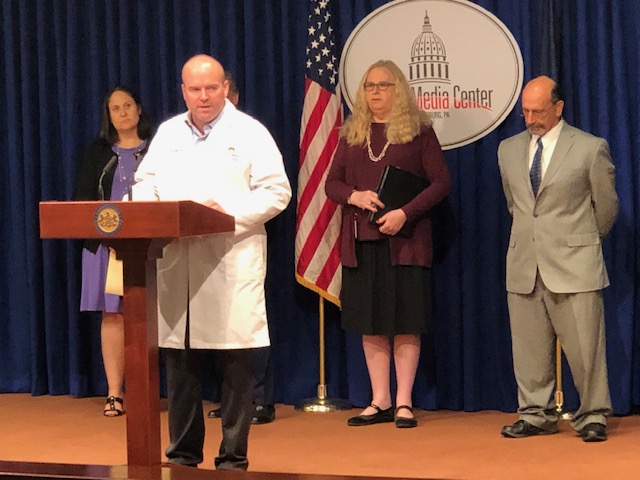Dr. Scott McCracken | Pa. Department of Health News Conference | Talking Points | 9/18/19

Thank you for that introduction, Doctor Levine, and thank you for inviting me to be a part of this event marking Stop Overdoses in PA Week.
As a family physician in the midst of the opioid crisis, I am often described as being on the “front lines” of the problem. In my practice – as well as in the exam rooms of family physicians, nurse practitioners, and physician assistants across the state – it is no exaggeration to say that we take care of patients directly affected by opioids EVERY SINGLE DAY.
We take care of workers with chronic back pain, young adults with mental health problems, and mothers and their children, struggling with opioid use disorder and neonatal abstinence.
From an exam room with a patient, it’s sometimes hard to appreciate the scope of a public health problem.
But when I see patients affected by the opioid crisis – hour after hour and day after day – it’s clear that this is one of the great chronic diseases of our time. Too often, I hear the story of a patient who overdosed and went to the emergency room, or worse, I find out in the obituaries – another tragic chapter in the crisis.
These all-to-frequent encounters create burden, complexity, and downstream effects which, in turn, impose a massive stress on the commonwealth’s primary care offices, both emotionally and as a resource. In this context, it can be incredibly challenging to help patients.
As a primary care physician, I ask myself:
How do I assess someone who takes opioids for chronic knee pain, but has just fallen and possibly re-injured themselves?
How do I treat the pregnant mother who struggles with depression and uses heroin to ease her sorrows?
How can I advise a patient with opioid use disorder, who is taking buprenorphine medication–assisted therapy, but needs dental surgery?
A few years ago, The Pennsylvania Department of Health heard questions like this from family physicians and others across the state. That’s what led to the creation of the Pennsylvania Safe Opioid Prescribing Task Force.
As a practicing family physician at WellSpan Community Health Center in York, and as a representative of the PA Academy of Family Physicians, it has been my honor and privilege to work with the Task Force.
Together, our task force has distilled the most up-to-date and advanced research on advising front-line physicians, providers, and health care workers, on best practices in opioid prescribing. The most recent addition to these guidelines, titled “Treating Pain in Patients with Opioid Use Disorder,” adds another key tool for front–line healthcare providers to use at the point of care.
With the expert leadership of Dr. Michael Ashburn at the University of Pennsylvania, our Task Force was able to provide guidance to physicians who treat patients with substance use disorders – both on and off medication assisted therapy – through periods of increased pain, such as an accident or a needed surgery.
Pain and substance use disorder are intensely personal experiences for patients, and successfully treatment can vary widely. But this new guideline provides valuable information on the safest and best options to help patients achieve pain control while, at the same time, minimizing the risk of relapsing, or overdosing, on opioids.
I can’t overstate how difficult an area this is in medicine.
These Pennsylvania guidelines are among the first in the nation to address this very challenging and increasingly common group of patients.
I personally manage patients with opioid use disorder and prescribe buprenorphine for some of those patients. And I have already used these guidelines to help successfully manage patients through some challenging pain management.
In closing, I’d again like to thank Dr. Levine and Sarah Boateng for their support of my practice, colleagues, and patients.
And I look forward to continued work in helping to reduce the burden of the opioid crisis in Pennsylvania.